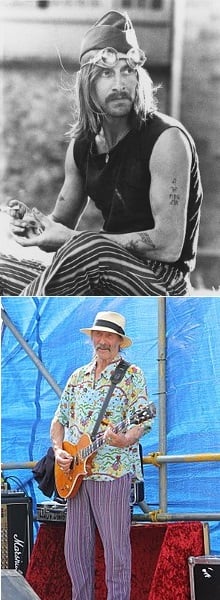For a few years in my teens I really wanted to be a hippy, but, perhaps because my taste in music was changing, I went almost overnight from wanting to look like this:
to wanting to look like this (Edwyn Collins, bottom left):
Wearing two t-shirts at the same time did not go down well with my mum, but at least she could end her search for the stripey trousers I was always asking for.
One thing that disenchanted me was seeing Woodstock and realizing how few of the people there really were hippies in any very extreme way. They looked like, and probably were, college students and people with jobs. They had longish hair, but nothing very unusual for the time, and they wore jeans and t-shirts like everybody else. Three days of peace, music, and love is a lot different from the new way of life that I thought it was all supposed to represent.
Ken Kesey's crew don't really seem like hippies either, and don't claim to be in the movie. They take a lot of drugs, which isn't very interesting for anyone but them, and they dress in red, white, and blue, like people in a Ralph Lauren ad from a few years ago. It looks pretty good. It's supposed to be something to do with the bus and its trip representing the USA, but that's a pretty obscure idea to me. I think they're trying to wake up a culture that has become very conservative, very sleepy. Which is potentially much more interesting, but not if it's just an excuse to take lots of drugs.
Ginsberg is more appealing. He seems to have had a serious interest in Asian philosophy, apparently was not a fan of Jim Morrison, and, according to a bunch of websites, said both that "Nobody saves America by sniffing cocaine" and "The only thing that can save the world is the reclaiming of the awareness of the world. That's what poetry does." I like all that. My favorite story about him, though, was told by Gordon at the reading. (Maybe this is well known, I don't know. It was news to me.) He said that they (Ginsberg and Ball) had once seen some graffiti that read: "Power comes from the barrel of a gun. -- Mao." Under this Ginsberg wrote: "Power comes from the imagination. --A. Ginsberg." I like that too. (Mao's claim is equally true, I think, but I prefer Ginsberg's truth to Mao's.)


No comments:
Post a Comment